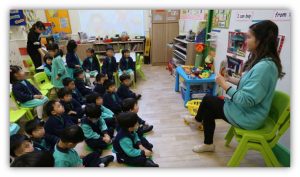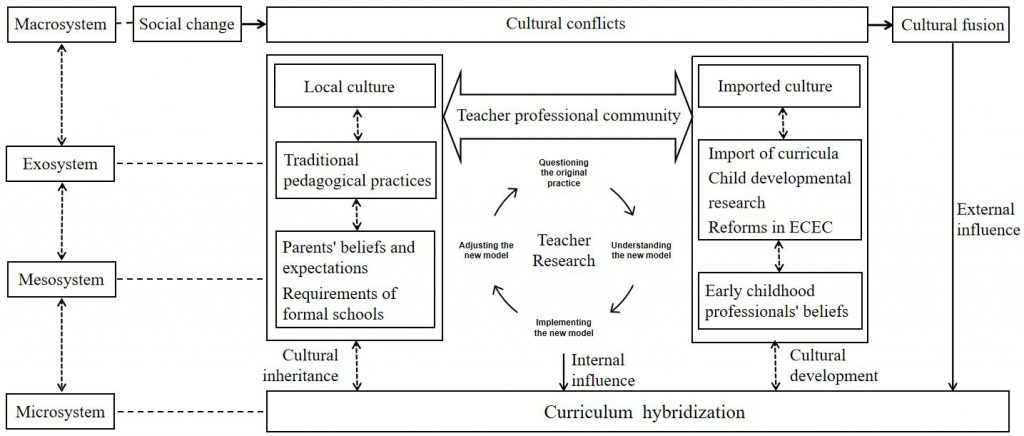Author: Dr. Weipeng Yang, Singapore University of Social Sciences, Singapore
It is perhaps a ‘given’ that educators deliver cultural traditions to learners through the teaching and the curriculum content that they choose. Despite their similarities across different countries, the early childhood curriculum (ECC) for educators is often context-specific. In this blogpost I would like to discuss this and suggest some considerations that might frame this debate.
ECC is the core of early childhood care and education (ECCE). The presence of a well-planned and coordinated curriculum is crucial to prioritise learning settings and provide learning goals and content for early childhood educators and centres (see for example Starting Strong Key OECD Indicators on Early Childhood Education and Care). ECC can act as a tool to improve early childhood educators’ professional development as well as adequately supporting children’s continuous growth in the early years.
The extent to which children are the products of a given society and culture will vary according to the strength of the different experiences and values of their communities, and consequently their learning may have differing trajectories. In 1987, developmentally appropriate practice (DAP) was first adopted in a position statement proposed by the National Association for the Education of Young Children (NAEYC), in the United States. Since then, it has become one of the most influential theoretical ideas in the field of ECCE throughout the world. Children’s agency is recognised as having an essential role in effective learning, constructed in play, social interaction, and community participation (Yang et al., 2020). Research shows that despite the mutual interactions and similarities, ECC policies and practices have been developed in context-specific ways across countries. For example, Australia’s and New Zealand’s (Te Whāriki) ECCs emphasise the development of the culturally competent child on top of the holistic development of a capable child, without segregating children’s learning into domains (Yang et al., 2020).
 Research on the cultural aspects of curriculum tends to regard the educator as a bearer of dominant cultural ideologies who delivers the local traditional culture to learners through teaching styles and curriculum content. For example, Chen et al. (2017) studied the ‘Hong Kong style’ of the Project Approach and found that the underlying mechanisms were contextually and philosophically driven. Contextually, there were real challenges, such as time pressure and curriculum demands, parental expectations for academic success, professional competence, emotional tensions and culturally driven pedagogical beliefs. Philosophically, these challenges were confounded by a set of different cultural beliefs about early education and a long-held tradition of practising teacher-directed Chinese pedagogy.
Research on the cultural aspects of curriculum tends to regard the educator as a bearer of dominant cultural ideologies who delivers the local traditional culture to learners through teaching styles and curriculum content. For example, Chen et al. (2017) studied the ‘Hong Kong style’ of the Project Approach and found that the underlying mechanisms were contextually and philosophically driven. Contextually, there were real challenges, such as time pressure and curriculum demands, parental expectations for academic success, professional competence, emotional tensions and culturally driven pedagogical beliefs. Philosophically, these challenges were confounded by a set of different cultural beliefs about early education and a long-held tradition of practising teacher-directed Chinese pedagogy.
 However, there is still a dearth of research on how culture may influence curriculum development in diverse contexts. It remains to be addressed whether culturally relevant and diverse content has been used in ECC, and what kind of ‘culturally sensitive curriculum development’ has happened in a particular society.
However, there is still a dearth of research on how culture may influence curriculum development in diverse contexts. It remains to be addressed whether culturally relevant and diverse content has been used in ECC, and what kind of ‘culturally sensitive curriculum development’ has happened in a particular society.
My research indicates a need of proposing a more inclusive and balanced framework for understanding ECC against the political and sociocultural backgrounds. This framework is supposed to integrate diverse orientations towards promoting children’s learning and development, not only by themselves as human beings, but also situated within the complex and changing sociocultural context. A fusion of developmental and cultural perspectives will require a hybrid model for ECC, which can be entitled ‘curriculum hybridization’ in ECC policies and practices (Yang et al., 2020).
A hybrid model of curriculum that reflects cultural conflicts and fusion is aligned with the important need to support early childhood educators and children with the access to cultural tools and diverse understandings of social issues. This will in turn equip them with the cultural self-awareness and intercultural understanding and competence over time. Understanding and and competence in cultural interchange will also enable early childhood educators to position and critically reflect on the curriculum policy requirements that they work with and transcends them as professionals (MacNaughton, 2003). The model of curriculum hybridization can provide a coherent analytic framework for achieving both cultural inheritance and cultural development in ECEC, which allows children’s learning experiences to be culture-sensitive and highly relevant to the changing society.
References:
Chen, J. J., Li, H., & Wang, J. Y. (2017). Implementing the project approach: A case study of hybrid pedagogy in a Hong Kong kindergarten. Journal of Research in Childhood Education, 31(3), 324-341. https://doi.org/10.1080/02568543.2017.1309479
MacNaughton, G. (2003). Shaping early childhood: Learners, curriculum and contexts. Open University Press.
Yang, W., & Li, H. (2019). Changing culture, changing curriculum: a case study of early childhood curriculum innovations in two Chinese kindergartens. The Curriculum Journal, 30(3), 279–297. https://doi.org/10.1080/09585176.2019.1568269
Yang, W., & Li, H. (2018). Cultural ideology matters in early childhood curriculum innovations: a comparative case study of Chinese kindergartens between Hong Kong and Shenzhen. Journal of Curriculum Studies, 50(4), 560–585. https://doi.org/10.1080/00220272.2018.1428367
Yang, W., & Li, H. (2020). The role of culture in early childhood curriculum development: A case study of curriculum innovations in Hong Kong kindergartens. Contemporary Issues in Early Childhood, 1463949119900359. https://doi.org/10.1177/1463949119900359
Yang, W., Xu, P., Liu, H., & Li, H. (2020). Neoliberalism and sociocultural specificities: a discourse analysis of early childhood curriculum policies in Australia, China, New Zealand, and Singapore. Early Child Development and Care, 1-17. https://doi.org/10.1080/03004430.2020.1754210
Author Bio:
Dr. Weipeng Yang is a Lecturer in Early Childhood Education at the Singapore University of Social Sciences. He is currently the Co-Convenor of the Curriculum, Assessment and Pedagogy SIG at the British Educational Research Association (BERA). He is also an Associate Editor of the Journal of Research in Childhood Education and guest editors of three international academic journals.
Contact: email: – weipengyang@suss.edu.sg Twitter: @Dr_Weipeng_Yang


